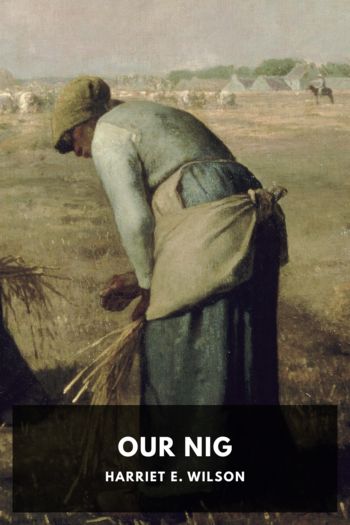Our Nig, Harriet E. Wilson [carter reed TXT] 📗

- Author: Harriet E. Wilson
Book online «Our Nig, Harriet E. Wilson [carter reed TXT] 📗». Author Harriet E. Wilson
By Harriet E. Wilson.
This ebook is the product of many hours of hard work by volunteers for Standard Ebooks, and builds on the hard work of other literature lovers made possible by the public domain.
This particular ebook is based on a transcription produced for Project Gutenberg and on digital scans available at the Internet Archive.
The writing and artwork within are believed to be in the U.S. public domain, and Standard Ebooks releases this ebook edition under the terms in the CC0 1.0 Universal Public Domain Dedication. For full license information, see the Uncopyright at the end of this ebook.
Standard Ebooks is a volunteer-driven project that produces ebook editions of public domain literature using modern typography, technology, and editorial standards, and distributes them free of cost. You can download this and other ebooks carefully produced for true book lovers at standardebooks.org.
“I know
That care has iron crowns for many brows;
That Calvaries are everywhere, whereon
Virtue is crucified, and nails and spears
Draw guiltless blood; that sorrow sits and drinks
At sweetest hearts, till all their life is dry;
That gentle spirits on the rack of pain
Grow faint or fierce, and pray and curse by turns;
That hell’s temptations, clad in heavenly guise
And armed with might, lie evermore in wait
Along life’s path, giving assault to all.”
In offering to the public the following pages, the writer confesses her inability to minister to the refined and cultivated, the pleasure supplied by abler pens. It is not for such these crude narrations appear. Deserted by kindred, disabled by failing health, I am forced to some experiment which shall aid me in maintaining myself and child without extinguishing this feeble life. I would not from these motives even palliate slavery at the South, by disclosures of its appurtenances North. My mistress was wholly imbued with southern principles. I do not pretend to divulge every transaction in my own life, which the unprejudiced would declare unfavorable in comparison with treatment of legal bondmen; I have purposely omitted what would most provoke shame in our good anti-slavery friends at home.
My humble position and frank confession of errors will, I hope, shield me from severe criticism. Indeed, defects are so apparent it requires no skilful hand to expose them.
I sincerely appeal to my colored brethren universally for patronage, hoping they will not condemn this attempt of their sister to be erudite, but rally around me a faithful band of supporters and defenders.
H. E. W.
Our Nig Or, Sketches from the Life of a Free Black, in a Two-Story White House, North. Showing That Slavery’s Shadows Fall Even There I Mag Smith, My MotherOh, Grief beyond all other griefs, when fate
First leaves the young heart lone and desolate
In the wide world, without that only tie
For which it loved to live or feared to die;
Lorn as the hung-up lute, that ne’er hath spoken
Since the sad day its master-chord was broken!
Lonely Mag Smith! See her as she walks with downcast eyes and heavy heart. It was not always thus. She had a loving, trusting heart. Early deprived of parental guardianship, far removed from relatives, she was left to guide her tiny boat over life’s surges alone and inexperienced. As she merged into womanhood, unprotected, uncherished, uncared for, there fell on her ear the music of love, awakening an intensity of emotion long dormant. It whispered of an elevation before unaspired to; of ease and plenty her simple heart had never dreamed of as hers. She knew the voice of her charmer, so ravishing, sounded far above her. It seemed like an angel’s, alluring her upward and onward. She thought she could ascend to him and become an equal. She surrendered to him a priceless gem, which he proudly garnered as a trophy, with those of other victims, and left her to her fate. The world seemed full of hateful deceivers and crushing arrogance. Conscious that the great bond of union to her former companions was severed, that the disdain of others would be insupportable, she determined to leave the few friends she possessed, and seek an asylum among strangers. Her offspring came unwelcomed, and before its nativity numbered weeks, it passed from earth, ascending to a purer and better life.
“God be thanked,” ejaculated Mag, as she saw its breathing cease; “no one can taunt her with my ruin.”
Blessed release! may we all respond. How many pure, innocent children not only inherit a wicked heart of their own, claiming lifelong scrutiny and restraint, but are heirs also of parental disgrace and calumny, from which only long years of patient endurance in paths of rectitude can disencumber them.
Mag’s new home was soon contaminated by the publicity of her fall; she had a feeling of degradation oppressing her; but she resolved to be circumspect, and try to regain in a measure what she had lost. Then some foul tongue would jest of her shame, and averted looks and cold greetings disheartened her. She saw she could not bury in forgetfulness her misdeed, so she resolved to leave her home and seek another in the place she at first fled from.
Alas, how fearful are we to be first in extending a helping hand to those who stagger in the mires of infamy; to speak the first words of hope and warning to those emerging into the sunlight of morality!





Comments (0)